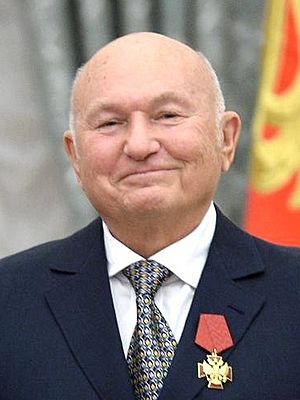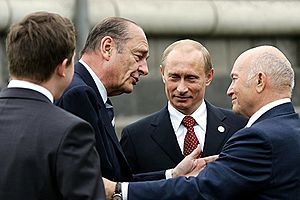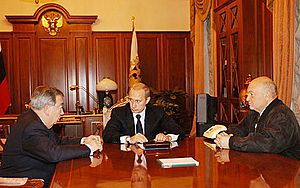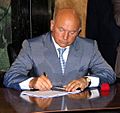Yury Luzhkov facts for kids
Quick facts for kids
Yury Luzhkov
|
|
|---|---|
|
Юрий Лужков
|
|
 |
|
| 2nd Mayor of Moscow | |
| In office 6 June 1992 – 28 September 2010 |
|
| Preceded by | Gavriil Popov |
| Succeeded by | Vladimir Resin (acting) Sergey Sobyanin |
| Deputy Chairman of the Committee on the Operational Management of the Soviet Economy | |
| In office 24 August 1991 – 29 October 1991 |
|
| Premier | Ivan Silayev |
| Personal details | |
| Born |
Yury Mikhaylovich Luzhkov
21 September 1936 Moscow, Russian SFSR, Soviet Union |
| Died | 10 December 2019 (aged 83) Munich, Germany |
| Resting place | Novodevichy Cemetery |
| Political party | CPSU (1968–1991) Fatherland (1998–2001) United Russia (2001–2010) |
| Spouses | |
| Children | 4 |
| Alma mater | Gubkin Moscow Petrochemical & Gas Industry Institute |
| Awards | |
| Signature | |
Yury Mikhailovich Luzhkov (born September 21, 1936 – died December 10, 2019) was a Russian politician. He was the mayor of Moscow from 1992 to 2010. Before that, he also led the city government from 1990 to 1991. He helped start the United Russia political party. During his time as mayor, Moscow's economy grew a lot. He also oversaw many big building projects. However, he faced criticism for some of his decisions. These included changing historic buildings and how traffic was managed. He was also criticized for the city's smog during the 2010 Russian wildfires. On September 28, 2010, President Dmitry Medvedev removed him from his position.
Contents
Yury Luzhkov: Early Life and Career
Yury Mikhailovich Luzhkov was born in Moscow on September 21, 1936. His father, Mikhail Andreyevich Luzhkov, moved to Moscow in the 1930s. He came from a small village in Tver Oblast.
Becoming Mayor of Moscow
In April 1990, Gavriil Popov became the head of the Moscow City Council. He suggested Luzhkov for a top position in the city government.
After the August coup in 1991, Luzhkov was given an important role. He became one of the deputy heads of a special committee. This committee was set up to manage the Soviet economy. It replaced the old government that had supported the coup. Luzhkov was in charge of areas like farming, trade, and social issues. He left this committee after two months to focus on his role as vice-mayor.
Leading Moscow: Key Changes and Challenges
City Architecture and Building Projects
During Luzhkov's time, many old Soviet buildings were changed or taken down. Examples include the Rossiya Hotel. Some neighborhoods, like Zamoskvorechye District, looked very different. The sculptor Zurab Tsereteli received Luzhkov's support. Many of Tsereteli's sculptures were placed around the city.
In 1999, Luzhkov started a big project to improve housing. Old five-story apartment blocks were replaced with new ones. These old buildings were not good for modern updates. The plan was to tear down 1,722 of them by 2010. Residents were moved into new homes before their old buildings were removed.
City Residency Rules
Luzhkov believed Moscow's services could not handle too many new people. So, he supported strict rules for living in the city, called propiska. This was a system for permanent residency. Some of these rules were later changed by courts. This made the registration process a bit easier.
Public Opinion and Popularity
In April 2001, most Moscow residents (63%) had a good view of Mayor Luzhkov. However, his popularity slowly went down over time. By October 2009, only 36% of people in Moscow saw him positively.
Dismissal from Office
On September 28, 2010, President Medvedev removed Luzhkov from his job. This happened after Luzhkov returned from a holiday. The reason given was "loss of trust." This is a common legal phrase in Russia for a dismissal. For years, people had thought Luzhkov might be removed. The government-controlled TV channels had shown programs criticizing Luzhkov. They talked about how he handled the 2010 Russian wildfires and other issues.
Luzhkov had also sent a letter to the President. In it, he criticized Medvedev's policies. The President's press secretary said Medvedev read the letter after the decision was made.
Life After Being Mayor
In November 2010, Luzhkov said he was sending his daughters to study in London. He wanted to protect them from possible problems. He and his wife planned to visit them often.
On October 1, 2010, Luzhkov was appointed Dean of a faculty at the International University in Moscow. This faculty focused on managing large cities. Luzhkov had helped create this faculty in 2002.
On his 80th birthday in 2016, President Vladimir Putin gave Luzhkov an award. It was the Order of Merit of the Fatherland, 4th degree. This was for his "active public work."
Yury Luzhkov in Russian Politics
In 1998, Luzhkov started his own political group called Otechestvo (Fatherland). This was during a time when President Boris Yeltsin faced political problems. Otechestvo had support from many powerful regional politicians. It grew even stronger when it joined with another party, Vsya Rossiya. They formed Otechestvo-Vsya Rossiya. Many thought Luzhkov and his new ally, former prime minister Yevgeny Primakov, would become very powerful.
However, things changed when Boris Yeltsin made Vladimir Putin the Prime Minister in August 1999. Putin quickly gained public support. The 1999 election saw Otechestvo-Vsya Rossiya come in third place. Luzhkov's party then joined with the pro-Putin Unity party. They formed the United Russia party. They supported Putin in the 2000 Russian presidential election, which he won easily. After this, Luzhkov was less active in national politics.
Personal Life and Hobbies
Luzhkov married his first wife, Marina Bashilova, in 1958. They had two sons, Mikhail and Alexander. Marina died in 1989. He then married Yelena Baturina in 1991. They had two daughters, Elena (born 1992) and Olga (born 1994).
Luzhkov often appeared at public events and festivals. He was a big supporter of Moscow. His hobbies included tennis and beekeeping. He was known for promoting physical fitness. A statue of him playing tennis was even made by Zurab Tsereteli.
Personal Beliefs
Luzhkov was a devoted Orthodox Christian. He often attended Christmas and Easter church services. He was friends with Patriarch Alexy II of Moscow. In 2005, he received an award from a fund for Orthodox Christians.
Luzhkov also supported the Northern river reversal project. He believed it would help solve water problems in Central Asia. He thought it could also bring money to Russia.
Death
Yury Luzhkov died on December 10, 2019, in Munich, Germany. He passed away after heart surgery.
Honours and Awards
Yury Luzhkov received many awards during his life. These included:
- Order "For Merit to the Fatherland" (various classes)
- Order of Military Merit
- Order of Honour
- Medal "Defender of a Free Russia"
- State Prize of the Russian Federation
- Order of Lenin
- Order of the Red Banner of Labour
- USSR State Prize
- Order of St. Mashtots (Armenia)
- Order of the Friendship of Peoples (Belarus)
- Order of Francysk Skaryna (Belarus)
- Order of Prince Yaroslav the Wise, 5th class (Ukraine)
- Bavarian Order of Merit (Germany)
- Order of St. Prince Vladimir Equal, 1st class (Russian Orthodox Church)
- Order of St. Sergius, 1st class (Russian Orthodox Church)
- Olympic Order (from the IOC)
Yury Luzhkov Foundation
The Yury Luzhkov Foundation was started in September 2020. Its goal is to remember his life and work. It also aims to share his ideas and achievements. President Vladimir Putin supported the creation of this foundation.
The Foundation works to support cultural and charity projects. These projects continue Luzhkov's efforts to help people in Moscow and Russia. A special focus is on getting young people involved. They work on finding solutions for modern city problems.
Foundation Projects and Programs
- An award for great theatre management was created in Luzhkov's name. It was first given out in June 2021.
- The Foundation works with the International Festival of Scientific and Technological Development for Children and Youth.
- Scholarships and grants are offered at Moscow universities. These honor Luzhkov's contributions to industry, science, and education.
- Other activities include sports tournaments, conferences, and helpful community events.
Images for kids
See also
 In Spanish: Yuri Luzhkov para niños
In Spanish: Yuri Luzhkov para niños
 | Bessie Coleman |
 | Spann Watson |
 | Jill E. Brown |
 | Sherman W. White |




